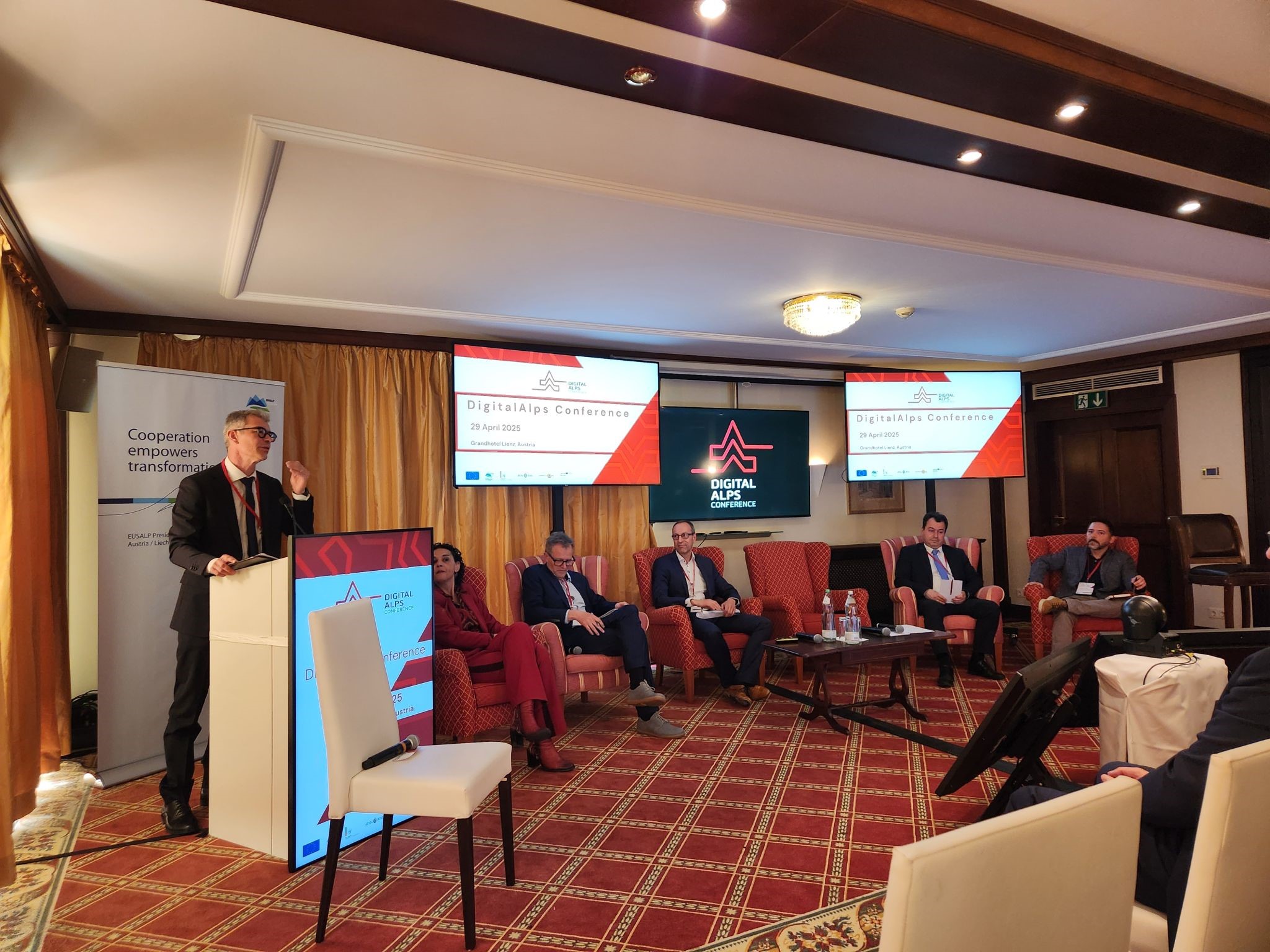The Digital Alps Conference 2025 in Lienz (AT) gathered decision-makers and experts to discuss how information and communication technologies (ICT), artificial intelligence (AI) and data processing can benefit rural areas. Rural areas face various challenges ranging from the negative effects of climate change in agriculture to lack of quality of or accessibility to public services. Against this background, the Digital Alps Conference – organised by the EUSALP Presidency held by Austria and Liechtenstein in cooperation with Action Group 5 “Connectiveness” – focused on the question how we can make better use of digitalisation to improve the quality of life in the countryside.
In their keynotes, Reinhard Willfort (Innovation Service Network Ltd.) and Sabine Singer (Sophisticated Simplicity Ltd.) addressed opportunities and risks of digital transformation and artificial intelligence. The keynotes were followed by workshops discussing how AI and dataspaces can be used to resolve rural challenges, how to build resilient digital infrastructure, and how to use open data to progress in EUSALP key priorities. In addition the workshop “Different ways of digital transformation of rural territories and cross-macro-regional perspectives” addressed the question on how macro-regional strategies can support smart rural development.
The future of smart rural communities across EU Macro-Regions
The EU Alpine Strategy has a history of promoting digital infrastructure and digital tools to boost development in mountainous regions. With strategic support from Action Group 5 “Connectiveness”, stakeholders from the Alpine Region have developed solutions under the smart village approach. The smart village approach combines digital tools with participatory governance to define challenges and develop innovative solutions in rural areas. The latest Alpine region project “Smart CommUnity” further develops this approach and looks into how functional areas can incorporate digital tools to enhance quality of life through improved mobility, food security, employment or climate change adaptation.
The Horizon-funded project Smart Era currently develops a methodology that embrases the insights from previous smart village initiatives and develops data sets, tools and methods for local communities. The objective is to develop methods and tools that enables municipalities to design their own approach to resolve local challenges with off-the-shelf solutions.
The cross-macro-regional cooperation on smart communities aims to take up those proven solutions and support their transfer throughout all four macro-regions.
Michael Roth from the Austrian EUSALP Presidency confirmed that smart villages will still play a role in the revised EUSALP Action Plan that is currently drafted. Going forward, the Alpine Strategy will likely adopt a more mission-oriented approach that will allow a more strategic roll-out of tested solutions and further development of initiatives to address the blind spots.
Claudia Singer-Smith, Priority Area Coordinator of Priority Area 10 “Institutional Capacity” expects a stronger emphasis to address smart rural development in the Danube Region, not only to address the “right to stay” as stated by the European Commission, but also as a means to support EU accession of candidate countries. With regards to the new Multi-annual Financial Framework (MFF), previous and current projects delivered proven methods that could be the basis for policy-makers for effective support for rural areas.
About Digital Alps Conference
The Digital Alps Conference is a major event of the Macro regional strategy for the Alpine area EUSALP. The conference will bring together visionary leaders, policy experts and pioneers to explore how digital technologies can unlock the full potential of rural and mountain territories in the Alps. The aim is to bring together all initiatives and projects dealing with digitalization in the Alps and to unleash the potentials of digitalization. More information on the conference can be accessed here: https://digitalalps.eu/




